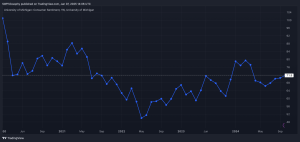The popularity of savings accounts has rocketed in recent years. But my belief that investing in FTSE 100 shares is a better way for me to build wealth has remained unshaken.
Today, the best-paying Cash ISA on the market (from Plum) offers an interest rate of 5.18%. That’s not bad. It means that someone saving £400 a month would create £344,206 after 30 years.
However, it’s far below what a long-term investor could have made by investing in a raft of Footsie shares in something like a Stocks and Shares ISA.
Better returns
Since 2010, the UK’s leading index has provided an average annual return of 7%. If this continues, a £400 monthly investment would turn into £487,988 over three decades.
That’s almost 42% more than that Cash ISA would have delivered.
To add to savers’ woes, the 5.18% savings rate that Plum’s offering is likely to fall as the Bank of England cuts interest rates. It could go up again over time, or it might keep falling. But in the near term, things are looking gloomy.
Risk and reward
Cash saving has a massive advantage of course. A £400 monthly investment in a Cash ISA will remain protected whatever happens.
This isn’t the same as a Stocks and Shares ISA, where that £400 could decrease if our stocks fall in value.
However, the better prospect of higher profits makes FTSE 100 stocks the place for me to park my money. This is why I have more of my money tied up in UK blue-chip shares than sitting in a cash account.
Here’s what I’m doing
I’ve limited the risk I face, too, by investing in stocks across various industries. Some of my major holdings are rental equipment provider Ashtead Group, financial services provider Legal & General, and soft drinks bottler Coca-Cola CCH.
In total, I own 12 different shares from the FTSE 100, giving me broad exposure to different industries and a variety of global markets.
Spreading one’s cash around doesn’t necessarily mean poor returns, either. To borrow some wise words from American economist Harry Markowitz: “diversification is the only free lunch in investing.”
The 7% long-term return of Footsie shares is evidence of this.
A FTSE share on my Xmas list
Like Warren Buffett, I love buying quality shares when they fall in price. So Associated British Foods (LSE:ABF), which has fallen 11% in the past year, is a stock I’m hoping to buy before Christmas.
Today its price-to-earnings (P/E) ratio is just 11.3 times. This is far below the Primark owner’s five-year average of 24.2 times.
This valuation slump is hard to fathom in my opinion. Okay, it faces severe pressures like cost inflation and high competition right now.
However, ABF also still has considerable scope for profits growth as Primark expands across the globe. Sales here remain rock-solid, and in its Northern European growth markets were up 6.1% in the 12 months to September.
With its food and ingredients businesses also offering diversification, I think Associated British Foods will prove a great addition to my Christmas stocking.
This post was originally published on Motley Fool







